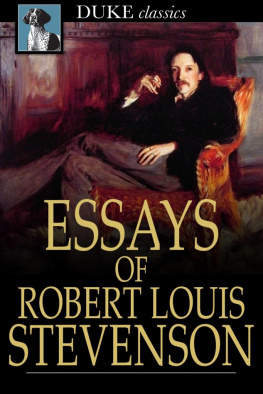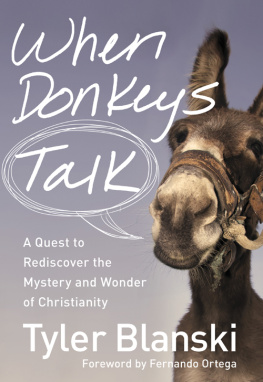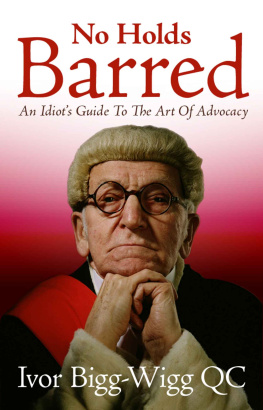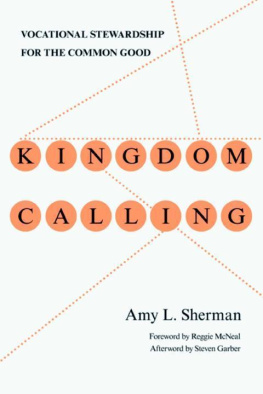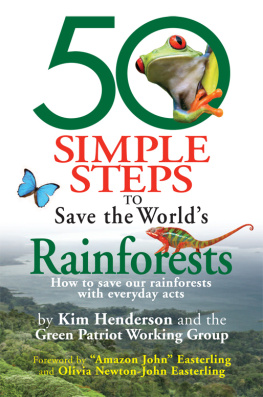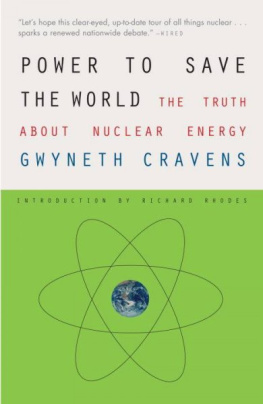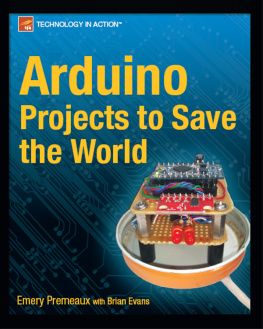The World Is Not Ours to Save
Finding the Freedom to Do Good
Tyler Wigg-Stevenson

www.IVPress.com/books
InterVarsity Press
P.O. Box 1400
Downers Grove, IL 60515-1426
World Wide Web: www.ivpress.com
E-mail: email@ivpress.com
2012 by Tyler Wigg-Stevenson
All rights reserved. No part of this book may be reproduced in any form without written permission from InterVarsity Press.
InterVarsity Press is the book-publishing division of InterVarsity Christian Fellowship/USA, a movement of students and faculty active on campus at hundreds of universities, colleges and schools of nursing in the United States of America, and a member movement of the International Fellowship of Evangelical Students. For information about local and regional activities, write Public Relations Dept. InterVarsity Christian Fellowship/USA, 6400 Schroeder Rd., P.O. Box 7895, Madison, WI 53707-7895, or visit the IVCF website at www.intervarsity.org.
All Scripture quotations, unless otherwise indicated, are taken from the Holy Bible, New International Version. NIV. Copyright 1973, 1978, 1984 by International Bible Society. Used by permission of Zondervan Publishing House. All rights reserved.
While all stories in this book are true, some names and identifying information in this book have been changed to protect the privacy of the individuals involved.
Published in association with the literary agency of Wolgemuth & Associates.
Cover design: Cindy Kiple
Interior design: Beth Hagenberg
Images: man dragging globe: robodread/iStockphoto
arrows: CHUTIMA CHOKKIJ/iStockphoto
ISBN 978-0-8308-6452-2
Contents
For Alan Cranston and John Stott,
whose going before has guided my way

About the Author

Tyler Wigg-Stevenson is the founder and director of the Two Futures Project, a movement of Christians for nuclear threat reduction and the global abolition of nuclear weapons. He also serves as chairman of the Global Task Force on Nuclear Weapons for the World Evangelical Alliance and as policy director for Faithful Security, a multi-faith coalition working for nuclear security.
Tyler began his involvement in nuclear policy over a decade ago under the late U.S. Senator Alan Cranston at the Global Security Institute, on whose board he still sits, and as study assistant to the Rev. Dr. John Stott. He is the author of Brand Jesus: Christianity in a Consumerist Age, a contributing editor at Sojourners magazine, politics columnist at Relevant magazine, and a regular writer and speaker on matters of faith and public life. His work has been profiled by a variety of secular and Christian media, including the Washington Post, Christianity Today, CQ, WORLD, ABC World News, and PBS's Religion & Ethics Newsweekly. Tyler is an ordained Baptist minister with degrees from Swarthmore College and Yale Divinity School.
1

The World Is Not Ours to Save
Thinking We Will Save the World

C ontemporary critics of Christianity often ask what good the faith has done. I would introduce them to any one of the extraordinary believers Ive come to know, whose faith compels them to work for myriad world-improving causes. Followers of Jesus, especially in the generation now coming of age, are near the heart of many places where the world shows signs of hope: clean water access, educational justice, HIV/AIDS treatment, creation care, poverty relief and development, microfinance, natural disaster response, post-conflict reconciliation, religious liberties, womens and childrens welfare, and work to combat human trafficking, slavery and sexual exploitation and many, many more.
The activist spirit animating twenty-first-century Christianity is impossible to understand without the historical context of the previous generations public engagement: that of the Religious Right and a more progressive wing typified by Jim Walliss Sojourners, Ron Siders Evangelicals for Social Action and Tony Campolos Evangelical Association for the Promotion of Education. These groups broke with the preceding generation of evangelicals by living out their faith in the public arena, seeking systemic solutions to systemic problems, a move that has been embraced by the generation that has followed them. In the typology of cultural change described by sociologist James Davison Hunter, Christians have shifted decidedly in their cultural engagement from exclusively individualistic Current Christian efforts to help the poor, for example, are likely to demonstrate a simultaneous commitment to addressing povertys root causes and providing direct aid to individuals and communities.
The current context of cultural and religious pluralism magnifies this development. After the disintegration of Christendoma historical apparatus that gave cultural pride of place to ChristianityChristian truth claims cannot be taken for granted or simply asserted using logical apologetics. Rather, the truth of the faith appears to stand or fall based on its goodness, as shown in the lives of those who claim it. This means that Christianity has something to prove, and this in turn has generated a faith that is focused outward, engaged with culture, concerned with authenticity and activist in its orientation.
As a thirty-something, my hopes and fears for this generation are the hopes and fears I have for myself. Both hope and fear have been amplified with increased exposure to how I have seen us living out our faith. I believe that this generation bears extraordinary promise, but the fulfillment of this promise depends on our ability to confront our particular weaknesses. That is, the shift to systems thinking is not simply about having a more comprehensive perspective on complex phenomena like poverty and ecology. It also often means that we engage such issues in a way that presupposes that, or at least acts as if, the human condition can be fixed through human effortthat the world is ours to save. This is a problem.
The reasons this belief makes for a fragile spiritual foundation for world engagement are the central concern of this book. We are already seeing hairline fractures, like the cause fatigue I increasingly encounter among younger Christians. This doesnt mean theres something wrong with causes per se, but rather that we need a better way to engage them. We need a sense of enduring calling.
Christians heaven-bent on saving the world make me fear for the church of ten, twenty or thirty years from nowwhen, barring the Lords return, the world is profoundly different than it is now but still irretrievably broken, violent and wicked. I wonder what will happen to us in the process.
Will zealous young Christians who are sold out for Christ eventually age out of faith-based activism, leaving our radical commitments for the safety of a private, middle-class churchianity that fits better with the demands of kids and family?
Will we go the other direction and reduce a gospel-proclaiming faith to its ethical and moral components, neglecting evangelism and sanctification in favor of a social program to which Jesus and the church are optional at best and superfluous at worst?



